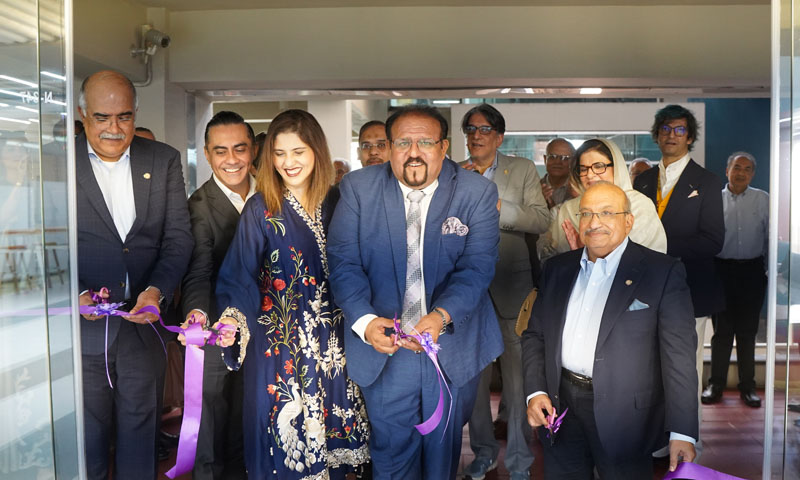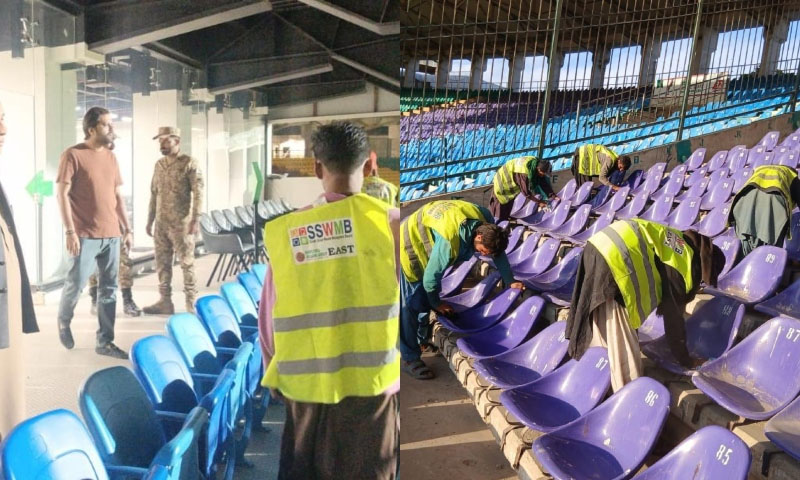- Web Desk
- Jan 12, 2026
Sindh senior minister celebrates Pakistan’s historic military, diplomatic victory
-

- Web Desk Karachi
- May 15, 2025

KARACHI, MAY 14: Sindh Senior Minister Sharjeel Inam Memon said the whole Pakistani nation is celebrating this historic win together. Celebrations in this regard are also being organized by the Pakistan Peoples Party (PPP). A rally has been organized today in Hyderabad, and more celebrations have also been planned by the Sindh government and the PPP for tomorrow.
He underlined the point that Pakistan always remained active in the war against terrorism. India was enjoying the fruits of terrorism when Pakistan was fighting it. He hinted that Indian and terrorist groups might have common interests that could be used to undermine the efforts of Western nations in their battle against terrorism and could possibly support each other on this front.
Addressing a press conference in Karachi, Sindh Senior Minister and Provincial Minister for Information, Transport, and Mass Transit Sharjeel Inam Memon stated that terrorist India imposed a war on peaceful Pakistan through acts of terrorism, to which Pakistan gave a befitting response. He said that India now stands isolated on the global stage and has suffered a historic defeat—one that serves as a powerful lesson for the country.
He added that the entire nation is proud of the achievements of Pakistan’s armed forces, particularly the exceptional bravery of Pakistan Air Force pilots. How Pakistani pilots annihilated Indian planes—once a matter of pride for India—is a world example of bravery and military prowess. How these planes were destroyed is being talked of around the world.
He added that in this war, Pakistan broke the pride related to Indian fighter aircraft like the Rafale and MiG-29 and successfully downed 84 Israeli-made drones. The destruction of the Rafale jets, he said, has cast serious doubts over India’s air superiority on the international stage.
He said that, Alhamdulillah, following the ceasefire, Pakistan gained a significant diplomatic advantage over India. International media reported that India initiated the ceasefire, which further strengthened Pakistan’s position on the global stage. Pakistan received support from friendly nations, and international analysts regarded the conflict as both a military and diplomatic success for Pakistan. The National Interest described it as a clear victory for Pakistan, while The Financial Times noted that the ceasefire had given Pakistan a diplomatic edge.
Senior Minister Sharjeel Inam Memon added that, in contrast to India, Pakistan had called for an impartial and internationally monitored investigation into the Pahalgam incident. India, however, responded with an extreme action without providing any evidence. He criticized Indian Prime Minister Narendra Modi for endangering the lives of 1.5 billion people across the subcontinent.
He recalled that Chairman Bilawal Bhutto Zardari had rightly referred to Modi as the “Butcher of Gujarat” and the “Butcher of Kashmir.” However, in light of recent events, he said, it is now appropriate to call Narendra Modi the “Butcher of South Asia.” He emphasized that the war initiated by Modi had the potential to result in extremely grave consequences for the entire region.
He stated that Narendra Modi imposed war on Pakistan with the intention of waging a prolonged conflict, aiming to portray himself as an “Asian Tiger.” However, he failed miserably in achieving that objective. Pakistan had made its position clear: if you start it, we will finish it—and that the timing and target would be of Pakistan’s choosing. Pakistan fulfilled that commitment.
He added that while India initially targeted innocent civilians, Pakistan responded with precision and professionalism. Pakistani fighter pilots selectively targeted Indian military aircraft—an action that stands as an unprecedented example of restraint and strategic excellence in modern warfare.
Senior Minister Sharjeel Inam Memon stated that Modi’s track record clearly shows he exploits incidents for political gain rather than delivering justice or promoting internal accountability. He emphasized that Pakistan is a peace-loving nation and welcomes President Trump’s efforts to promote peace.
He said, India not only failed to acknowledge the positive role played by the U.S. President, but also criticized him for urging restraint and discouraging reckless military action. According to Memon, anyone who opposes Modi’s war-mongering agenda is labeled an enemy by him.
He said that now it must be clear to the world who the real enemy of peace is. Pakistan wants peace, whereas Modi promotes hatred and exports it.
He explained that India has been the actual beneficiary of the war on terror globally. Post-9/11, India has capitalized on the situation by delegitimizing the rightful struggle for self-determination as terrorism. India used terrorist attacks as a pretext for years to pursue its hate-based strategic interests.
He noted that after the Pahalgam incident, India unilaterally suspended the Indus Waters Treaty, and after the Balakot incident, it abrogated Articles 370 and 35A of its constitution.
Despite the decades-long struggle of the Kashmiri people, India has consistently marginalized and ignored their demands, further alienating them from the democratic process.
Sharjeel Inam Memon stated that all of India’s neighboring countries are increasingly unhappy and uneasy with its behavior. Whether it’s China, Bangladesh, or Nepal—none are satisfied with India’s actions.
He praised the role of Pakistani media during the recent events, saying that the way media outlets advocated for Pakistan’s stance deserves commendation. In contrast, India imposed strict restrictions on Pakistani media, YouTubers, vloggers, and artists—individuals widely recognized as ambassadors of peace and culture. This, he said, is a clear reflection of India’s narrow-mindedness and intolerance.
He said that this war was fought by the entire nation—from those who prayed for the armed forces from their homes to the media representatives who actively defended Pakistan’s narrative. Everyone played a role.
He highlighted that Bilawal Bhutto Zardari strongly advocated for Pakistan on the international stage. In this war, we witnessed the legacy and spirit of three generations of the Pakistan People’s Party: Shaheed Zulfikar Ali Bhutto, Shaheed Benazir Bhutto, President Asif Ali Zardari, and now Chairman Bilawal Bhutto Zardari. Their leadership and commitment were reflected in Pakistan’s unified stance during this critical time.
Sharjeel Inam Memon stated that the international media was eager to hear Pakistan’s position, and Chairman Bilawal Bhutto Zardari effectively presented it in a comprehensive and articulate manner. He said that a new Pakistan has emerged after the war—a Pakistan that stood united during a time of great challenge.
He emphasized the need to carry this spirit of unity forward, particularly on the economic front. “I appreciated President Donald Trump’s words,” he said, “that we do not want war, we want trade.” In contrast, he added, Narendra Modi has consistently used war hysteria for political gain. It is worth remembering, he noted, that before becoming Prime Minister, Modi was banned from entering the United States due to his controversial past.
In response to a question, Senior Minister Sharjeel Inam Memon said that Chairman Bilawal Bhutto Zardari does not need any official position to defend Pakistan’s case. He effectively presented Pakistan’s stance on international platforms in a comprehensive and impactful manner.
Responding to another question, he said that the greatest credit for the victory in the war goes to our Shaheens (fighter pilots). The courage with which they altered the course of the conflict and returned safely has made them our national heroes.
In reply to another question, the Senior Minister stated that India’s defeat was the result of Pakistan’s unity and alliance. He said that due to this alliance, India is now facing internal instability. He added that one individual, driven by war hysteria, put the lives of the entire Asian population at risk—a move that cannot simply be described as a war crime; it goes far beyond that.
Answering another question, he said that India used the Pahalgam incident merely as a pretext—the real target was the Indus Waters Treaty, which it suspended under false pretenses.




